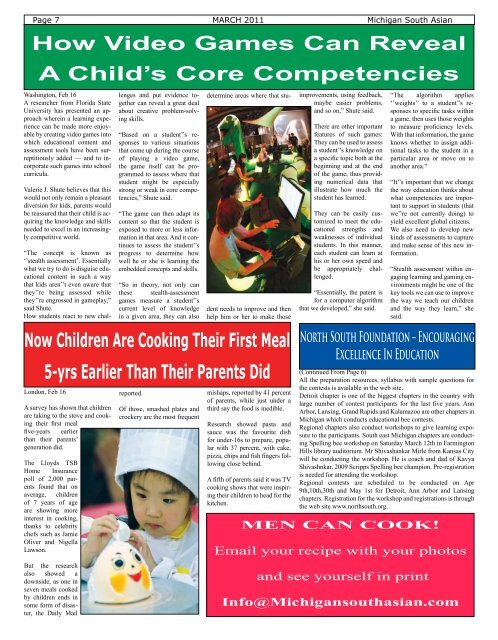Mar 2011 - Michigan South Asian
Mar 2011 - Michigan South Asian
Mar 2011 - Michigan South Asian
Create successful ePaper yourself
Turn your PDF publications into a flip-book with our unique Google optimized e-Paper software.
Page 7 MARCH <strong>2011</strong> <strong>Michigan</strong> <strong>South</strong> <strong>Asian</strong><br />
How Video Games Can Reveal<br />
A Child’s Core Competencies<br />
Washington, Feb 16<br />
A researcher from Florida State<br />
University has presented an approach<br />
wherein a learning experience<br />
can be made more enjoyable<br />
by creating video games into<br />
which educational content and<br />
assessment tools have been surreptitiously<br />
added — and to incorporate<br />
such games into school<br />
curricula.<br />
Valerie J. Shute believes that this<br />
would not only remain a pleasant<br />
diversion for kids, parents would<br />
be reassured that their child is acquiring<br />
the knowledge and skills<br />
needed to excel in an increasingly<br />
competitive world.<br />
“The concept is known as<br />
‘’stealth assessment’. Essentially<br />
what we try to do is disguise educational<br />
content in such a way<br />
that kids aren’’t even aware that<br />
they’’re being assessed while<br />
they’’re engrossed in gameplay,”<br />
said Shute.<br />
How students react to new challenges<br />
and put evidence together<br />
can reveal a great deal<br />
about creative problem-solving<br />
skills.<br />
“Based on a student’’s responses<br />
to various situations<br />
that come up during the course<br />
of playing a video game,<br />
the game itself can be programmed<br />
to assess where that<br />
student might be especially<br />
strong or weak in core competencies,”<br />
Shute said.<br />
“The game can then adapt its<br />
content so that the student is<br />
exposed to more or less information<br />
in that area. And it continues<br />
to assess the student’’s<br />
progress to determine how<br />
well he or she is learning the<br />
embedded concepts and skills.<br />
“So in theory, not only can<br />
these stealth-assessment<br />
games measure a student’’s<br />
current level of knowledge<br />
in a given area, they can also<br />
determine areas where that student<br />
needs to improve and then<br />
help him or her to make those<br />
Now Children Are Cooking Their First Meal<br />
5-yrs Earlier Than Their Parents Did<br />
London, Feb 16<br />
A survey has shown that children<br />
are taking to the stove and cooking<br />
their first meal<br />
five-years earlier<br />
than their parents’<br />
generation did.<br />
The Lloyds TSB<br />
Home Insurance<br />
poll of 2,000 parents<br />
found that on<br />
average, children<br />
of 7 years of age<br />
are showing more<br />
interest in cooking,<br />
thanks to celebrity<br />
chefs such as Jamie<br />
Oliver and Nigella<br />
Lawson.<br />
But the research<br />
also showed a<br />
downside, as one in<br />
seven meals cooked<br />
by children ends in<br />
some form of disaster,<br />
the Daily Mail<br />
reported.<br />
Of those, smashed plates and<br />
crockery are the most frequent<br />
mishaps, reported by 41 percent<br />
of parents, while just under a<br />
third say the food is inedible.<br />
Research showed pasta and<br />
sauce was the favourite dish<br />
for under-16s to prepare, popular<br />
with 37 percent, with cake,<br />
pizza, chips and fish fingers following<br />
close behind.<br />
A fifth of parents said it was TV<br />
cooking shows that were inspiring<br />
their children to head for the<br />
kitchen.<br />
improvements, using feedback,<br />
maybe easier problems,<br />
and so on,” Shute said.<br />
There are other important<br />
features of such games:<br />
They can be used to assess<br />
a student’’s knowledge on<br />
a specific topic both at the<br />
beginning and at the end<br />
of the game, thus providing<br />
numerical data that<br />
illustrate how much the<br />
student has learned.<br />
They can be easily customized<br />
to meet the educational<br />
strengths and<br />
weaknesses of individual<br />
students. In this manner,<br />
each student can learn at<br />
his or her own speed and<br />
be appropriately challenged.<br />
“Essentially, the patent is<br />
for a computer algorithm<br />
that we developed,” she said.<br />
MEN CAN COOK!<br />
Email your recipe with your photos<br />
and see yourself in print<br />
“The algorithm applies<br />
‘’weights’’ to a student’’s responses<br />
to specific tasks within<br />
a game, then uses those weights<br />
to measure proficiency levels.<br />
With that information, the game<br />
knows whether to assign additional<br />
tasks to the student in a<br />
particular area or move on to<br />
another area.”<br />
“It’’s important that we change<br />
the way education thinks about<br />
what competencies are important<br />
to support in students (that<br />
we’’re not currently doing) to<br />
yield excellent global citizens.<br />
We also need to develop new<br />
kinds of assessments to capture<br />
and make sense of this new information.<br />
“Stealth assessment within engaging<br />
learning and gaming environments<br />
might be one of the<br />
key tools we can use to improve<br />
the way we teach our children<br />
and the way they learn,” she<br />
said.<br />
North <strong>South</strong> Foundation – Encouraging<br />
Excellence In Education<br />
(Continued From Page 6)<br />
All the preparation resources, syllabus with sample questions for<br />
the contests is available in the web site.<br />
Detroit chapter is one of the biggest chapters in the country with<br />
large number of contest participants for the last five years. Ann<br />
Arbor, Lansing, Grand Rapids and Kalamazoo are other chapters in<br />
<strong>Michigan</strong> which conducts educational bee contests.<br />
Regional chapters also conduct workshops to give learning exposure<br />
to the participants. <strong>South</strong> east <strong>Michigan</strong> chapters are conducting<br />
Spelling bee workshop on Saturday <strong>Mar</strong>ch 12th in Farmington<br />
Hills library auditorium. Mr Shivashankar Mirle from Kansas City<br />
will be conducting the workshop. He is coach and dad of Kavya<br />
Shivashnkar, 2009 Scripps Spelling bee champion. Pre-registration<br />
is needed for attending the workshop.<br />
Regional contests are scheduled to be conducted on Apr<br />
9th,10th,30th and May 1st for Detroit, Ann Arbor and Lansing<br />
chapters. Registration for the workshop and registrations is through<br />
the web site www.northsouth.org.<br />
Info@<strong>Michigan</strong>southasian.com






